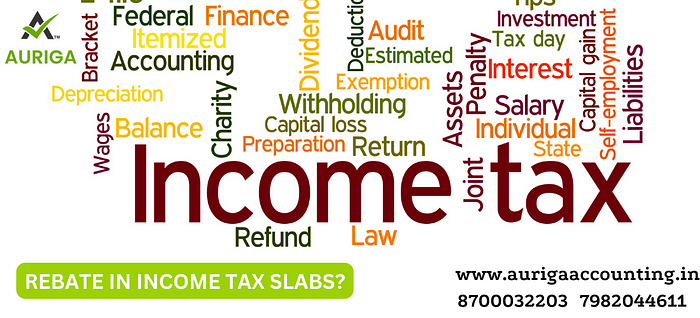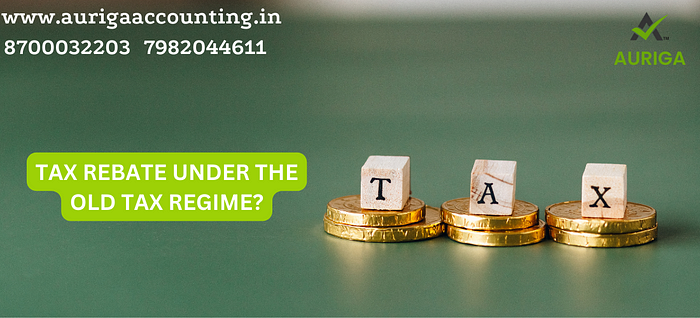
A rebate in the context of income tax refers to a partial refund or reduction in the amount of tax owed by an individual or entity. It is a way to provide relief to taxpayers by returning a portion of the taxes they have paid. Rebates are often used to encourage specific behaviors, promote certain investments, or provide assistance to particular groups.
In some countries, tax rebates are offered for various reasons, such as promoting energy-efficient practices, encouraging savings, supporting education, or helping low-income individuals. The eligibility criteria and the amount of rebate can vary based on the specific tax laws and regulations of each jurisdiction.

who is eligible for taking Rebate in Income Tax?
- Low-Income Individuals: Some tax rebates are targeted toward individuals with lower incomes to provide financial relief.
- Homeowners: Certain jurisdictions offer rebates to homeowners for activities such as making energy-efficient improvements to their homes or installing solar panels.
- Education Expenses: Tax rebates may be available for individuals who incur qualifying education expenses, such as tuition and fees.
- Child and Dependent Care: Parents or guardians may be eligible for rebates related to child and dependent care expenses.
- Healthcare Costs: Some jurisdictions provide rebates for medical expenses or health insurance premiums.
- Retirement Savings: Tax rebates may be available to encourage individuals to save for retirement through specific retirement savings plans.
- Energy Efficiency: Governments may offer rebates for individuals who invest in energy-efficient appliances, vehicles, or home improvements.
- Investments: In some cases, tax rebates or incentives are provided to individuals who make specific investments, such as in startups or designated sectors.
- Special Circumstances: Certain taxpayers facing unique situations, such as disability, may be eligible for specific tax rebates or credits.

Section 87A of the Income Tax Act, of 1961, stipulates a rebate in the income tax payable for resident individuals whose taxable income does not exceed a specified limit. For the financial year 2024–25 (Assessment Year 2025–26), the rebate threshold remains unchanged, standing at Rs. 7,00,000 under the updated tax structure.
This implies that a resident individual with a taxable income of up to Rs. 7,00,000 is eligible for a rebate of Rs. 25,000 or the actual amount of tax payable, whichever is lower. In the traditional tax framework, the rebate limit persists at Rs. 5,00,000, and the corresponding rebate amount is Rs. 12,500.

What are the Steps to Claim Rebate u/s 87A Rebate in ITR Filing?
- Begin by determining your Gross Total Income for the financial year 2024–2025.
- Subtract any eligible tax deductions, such as those for life insurance policies, investments, and other tax-saving instruments.
- Calculate your total income after accounting for the deductions available under the Income Tax Act, of 1961.
- When filing your Income Tax Return (ITR), declare both your Gross Income and the applicable tax deductions.
- Upon completing the ITR filing process, proceed to claim the tax rebate under Section 87A.

Tax Rebate under the Old Tax Regime
Individuals who choose the traditional tax regime and possess a taxable income not exceeding Rs. 5 lakh are entitled to a tax rebate of Rs. 12,500 according to Section 87A.
This rebate will be granted as the lesser of 100% of the income-tax liability or Rs. 12,500.
To qualify for this rebate, the tax liability must be less than Rs. 12,500.
Tax Rebate under the New Tax Regime
Resident individuals selecting the new tax regime under Section 115 BAC(1A) and having a total income of up to Rs. 7 lakhs are eligible for a maximum rebate of Rs. 25,000.
In instances where the total income surpasses Rs. 7 lakhs and the tax payable exceeds the difference between the total income and Rs. 7 lakhs, individuals can claim marginal relief.
This rebate specifically addresses the disparity between the tax payable on the total income and the portion exceeding Rs. 7 lakhs.

Advantages of Rebate in Income Tax
- Financial Relief: Rebates provide direct financial relief to eligible taxpayers by reducing the amount of tax they owe. This can be particularly beneficial for individuals with lower incomes or facing specific financial challenges.
- Encouragement of Desired Behavior: Governments use rebates to incentivize certain behaviors or activities that are deemed beneficial for the economy or society. For example, rebates may be provided for investments, education expenses, or energy-efficient practices, encouraging taxpayers to engage in these activities.
- Support for Specific Groups: Rebates can be targeted to support specific groups of taxpayers, such as senior citizens, disabled individuals, or families with children. This targeted support helps address the unique needs of these groups.
- Promotion of Savings and Investments: Some rebates are designed to promote savings and investments by offering tax incentives for contributions to retirement accounts, investments in specified sectors, or the purchase of certain financial products.
- Tax Fairness: Rebates contribute to a fairer tax system by providing relief to individuals with lower incomes, ensuring that they are not unduly burdened by taxes.
- Stimulating Economic Growth: By encouraging specific economic activities through rebates, governments aim to stimulate economic growth in certain sectors, leading to increased employment and overall economic development.
- Compliance Incentives: Rebates can serve as incentives for taxpayers to comply with certain tax regulations. For example, a rebate for timely filing of tax returns or adherence to specific reporting requirements may encourage better tax compliance.

